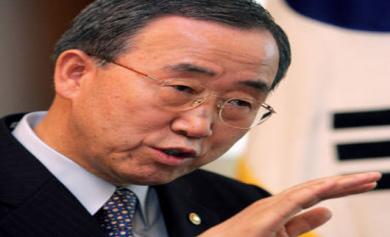
United Nations Secretary-General Ban Ki-moon has exhorted member states to take effective legislative, administrative and judicial measures to prevent torture.
This was even as he called the practice a brutal and unjustifiable attempt to destroy a victim’s sense of dignity and human worth.
“There are no exceptional circumstances whatsoever – whether a state of war, or a threat of war, internal political instability, or any other public emergency or national security situation,” the secretary-general said in a message to mark the International Day in Support of Victims of Torture, observed recently.
“States’ obligations also include the duty to provide effective and prompt redress, compensation and rehabilitation for all torture victims,” he said.
“On the International Day in Support of Victims of Torture, we honour the men and women who have suffered, enduring their ordeal with courage and inner strength. We mourn, too, those who did not survive.”
He pointed out that the recent coming into force of the International Convention for the Protection of All Persons from Enforced Disappearances was a welcome addition to international human rights law, and described enforced disappearances as another manifestation of torture.
Mr. Ban urged all UN member states to allow full and unhindered access by the UN Special Rapporteur on Torture to all places where people are deprived of liberty, and called on those countries that had not done so to ratify the Convention against Torture.
“Torture and other forms of cruel, degrading and inhuman treatment and punishment, wherever they occur and whatever the circumstances, can never be justified,” he insisted.
In a separate statement to mark the event, the UN High Commissioner for Human Rights, Navi Pillay, warned that those who perpetrate torture would be brought to justice no matter how long it took.
She gave the example of Argentina’s former prison director, Abel Dupuy, who ordered the systematic torture, cruel, inhuman and degrading treatment of possibly hundreds of political prisoners during the country’s military dictatorship in the late 1970s and early 1980s.
Mr. Dupuy was last year convicted and sentenced to life in prison, 30 years after he started ordering the torture of those arrested.
“Torture is illegal, and if carried out on a systematic basis can amount to a war crime or a crime against humanity. No circumstances, however exceptional, justify the use of torture against anyone for any reason.
Neither a state of emergency nor conflict; neither the fight against terrorism nor the fight against crime excuses the use of torture,” said Ms. Pillay.
She lamented that despite the blanket ban on torture under international law, despotic governments and dysfunctional criminal justice systems perpetrated the crime every day.
“As we have seen very graphically in North Africa and the Middle East over the past few months, men, women and even children are tortured in detention simply for expressing their political views, in order to force confessions, or just because they were in the wrong place at the wrong time,” said Ms. Pillay.
She said that those perpetrating torture and those who gave the orders did so with an expectation of impunity, but thanks to the courage and determination of victims and survivors,
and the tireless efforts of human rights defenders, accountability is increasingly taking place and the perpetrators should no longer expect to get away with such heinous crimes.

